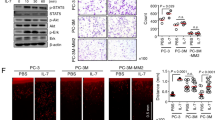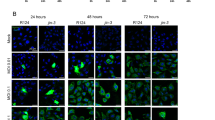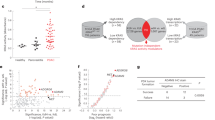Abstract
CD66a (human homolog of rat cell-cell adhesion molecule, also known as biliary glycoprotein) is a cell surface protein of the immunoglobulin family. CD66a has been shown to mediate homotypic cell adhesion. Aside from this, no other functions of this molecule have been demonstrated. We have observed previously that CD66a protein expression is lost in most prostate tumors, suggesting that the down-regulation of CD66a is associated with the abnormal growth of prostate cells. CD66a is homologous (65% identity) to rat cell-cell adhesion molecule, which has been shown to have tumor-suppressive activity. This homology suggests the possibility that CD66a might also be a tumor suppressor. In this report, we show that restoring CD66a expression in DU145 human prostate cancer cells by adenovirus (Ad)-mediated gene transfer dramatically altered the malignant phenotype of these cells, as evidenced by their reduced ability to form tumors in a xenograft animal model. This result suggests that loss of CD66a protein plays an important role in the development of prostate cancer, and that restoring CD66a expression might provide an effective treatment for prostate cancer. We further explored the possibility of using Ad vectors to deliver CD66a as a potential therapeutic agent for prostate cancer. Direct injection of Ad-CD66a, an Ad vector carrying the CD66a gene, into DU145 tumors in mice significantly suppressed the growth of these tumors. This antitumor activity of CD66a was found to be dose-dependent. These results suggest that CD66a has tumor-suppressive activity and that Ad-CD66a is a potential therapeutic agent for prostate cancer treatment.
This is a preview of subscription content, access via your institution
Access options
Subscribe to this journal
Receive 12 print issues and online access
$259.00 per year
only $21.58 per issue
Buy this article
- Purchase on Springer Link
- Instant access to full article PDF
Prices may be subject to local taxes which are calculated during checkout
Similar content being viewed by others
Author information
Authors and Affiliations
Corresponding author
Rights and permissions
About this article
Cite this article
Luo, W., Tapolsky, M., Earley, K. et al. Tumor-suppressive activity of CD66a in prostate cancer. Cancer Gene Ther 6, 313–321 (1999). https://doi.org/10.1038/sj.cgt.7700055
Received:
Accepted:
Published:
Issue Date:
DOI: https://doi.org/10.1038/sj.cgt.7700055
Keywords
This article is cited by
-
The role of antibody expression and their association with bladder cancer recurrence: a single-centre prospective clinical-pilot study in 35 patients
BMC Urology (2020)
-
Loss of CEACAM1 is associated with poor prognosis and peritoneal dissemination of patients with gastric cancer
Scientific Reports (2019)
-
The role of CEA-related cell adhesion molecule-1 (CEACAM1) in vascular homeostasis
Histochemistry and Cell Biology (2016)
-
CEACAM1 and hollow spheroid formation modulate the chemosensitivity of colorectal cancer to 5-fluorouracil
Cancer Chemotherapy and Pharmacology (2015)
-
Vitamin D inhibits CEACAM1 to promote insulin/IGF-I receptor signaling without compromising anti-proliferative action
Laboratory Investigation (2011)



